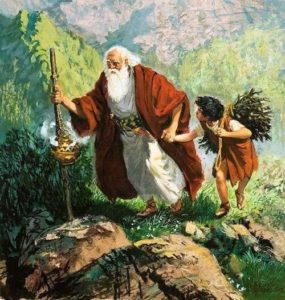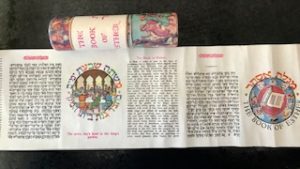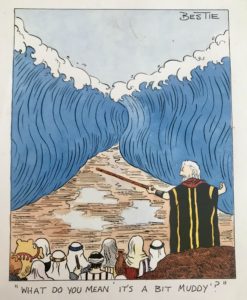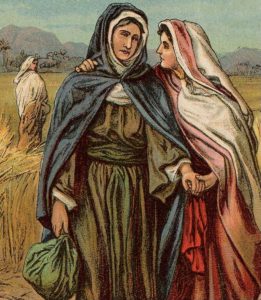In this Article I have included the background stories to six of the major festivals as they occur in chronological order throughout the Jewish Calendar –
Rosh Hashanah, Yom Kippur, Chanucah, Purim, Passover and Shavuot.
Rosh Hashanah
The Binding of Isaac
After many years of waiting, Abraham and Sarah were finally blessed with a son, Isaac. He grew to be a strong and lively boy. Then one day God called to Abraham and told him to take Isaac to a far away mountain and offer him to God as a sacrifice. Abraham was truly horrified. He couldn’t understand why God was asking such a thing when He knew how desperately they had wanted a child and how precious Isaac was.
But because of his unswerving faith, Abraham took Isaac on a three day journey to the mountain, not telling Isaac why. After a while Isaac asked him where the lamb was for the sacrifice and Abraham answered him ‘God will provide it’.
Abraham set up the sacrifice and laid Isaac down. Just as he was about to kill him, God’s Angel called out to him ‘Do not harm the boy. Because you would have given God your only son, he knows now that you are true to him.’ Abraham then saw a ram nearby and sacrificed this instead.
The Angel then told him that because he had obeyed God, both he and his son would be blessed. He told him ‘You will have as many descendants as there are stars in the sky, as many descendants as there are grains of sand on the seashore and they shall become a great people.’
Yom Kippur
The Book of Jonah (simplified!)
Many prophets lived in the Holy Land. Their job was to remind the Jews to keep God’s laws. One day, God spoke to the prophet Jonah and told him to go to Nineveh, many miles away, and tell the people there that unless they turned from their wicked, pagan ways, God would destroy their fine city. However Jonah didn’t want to go. He thought they deserved to be punished so he ran away and boarded a ship heading to Tarshish, in the opposite direction to Nineveh.
No sooner had the ship reached open water than a terrible storm sprang up from nowhere. The crew did all they could to keep the ship from sinking and prayed to their pagan gods. Jonah knew that the storm was because he had made God angry by running away. He told the sailors to throw him overboard.
Reluctantly they did so and immediately the storm abated. The amazed sailors began to pray to God, realising that He was the one true God.
Jonah was certain he was going to die but God sent a giant fish which swallowed him whole. Jonah prayed inside the fish’s belly, thanking God for saving him, asking for forgiveness and promising to carry out His wishes.
After three days, the fish burped Jonah out onto dry land. It took him another three days travelling to reach Nineveh where he gave the people God’s message. They repented and God forgave them.
Jonah then blessed the people and thanked God by saying ‘Thank you, Lord, for giving all Your children a chance to do better if they have done wrong the first time’.
Chanucah
Chanucah was first celebrated over 2000 years ago, in the year 166 B.C.E. The story took place in the land of Judea (later Israel) which was part of the Greek Empire, under the rulership of the the Syrians. For many years the Jews had worshipped in freedom until King Antiochus came to power. He refused to let them continue this and wanted them to assimilate in all ways, including bowing down to the Greek gods. Of course, this is something Jews cannot do- we only bow down to God. Antiochus ordered his soldiers to kill any who refused and they then stormed the Temple in Jerusalem, destroying almost everything and setting up their own gods inside.
Some Jews capitulated for fear of their lives, others ran away but were followed by the soldiers.
One day the soldiers came to the town of Modiin, not far from Jerusalem, set up a Greek idol in the marketplace and ordered all the Jews to bow down to it. The town leader, Mattathias, refused and call on all Jews to follow him and fight back. He appointed one of his five sons, Judah, to be the leader. He soon gained the nickname ‘Maccabee’ meaning ‘hammer’ because of his style of fighting. The Maccabees used ‘guerilla’ tactics to ‘hammer’ away at the enemy. On paper, the Maccabees did not stand a chance! They were not trained soldiers, they had not much armour or weaponry and they were very few in number, being mainly farmers, shepherds and teachers.
On the other hand, the Syrian army was comprised of thousands of well trained, well equipped soldiers who had the latest weapons and rode on horseback and even elephants!
However Judah and the Maccabees had two main advantages. Firstly they knew the hills, caves and countryside of Judea so they could move quickly. They knew all the best places to launch surprise attacks and ambush the Syrian army, as well as setting fire to their camps under cover of darkness. Then they would ‘melt away’ – they were a very elusive enemy! Even more importantly, they were fighting for the right to practice their faith in freedom and this gave them extra courage. We say ‘they had God on their side’ and this made them ‘Hazak v’amatz’ – strong and brave.
Eventually after three long years of fighting, the Maccabees were victorious! Jews call this a ‘miracle’ as it was such a surprising outcome.
Finally the Maccabees entered Jerusalem and began to rededicate the Temple. They removed all the Greek idols, built a new Holy Altar and set up the Menorah ready to re-light it. However they only found a small jar of oil, enough to to last for one day. They lit it anyway and Judah sent his fastest rider to collect more. It took him eight days to return but to everyone’s surprise, the Everlasting Light was still burning! This is the second ‘miracle’ in the story and the reason why we light the Chanuciah for eight nights.
On 25th of the Hebrew month of Kislev, the Jews rededicated the Temple, gave thanks to God for the victory and celebrated joyfully for eight days.
Purim
The Megillah ( simplified!)
About 2,500 years ago, in the city of Shushan in the land of Persia, there ruled a king named Ahasuerus. Ahasuerus liked to party with his ministers and one day they told the king they had heard of the beauty of his queen, Vashti. The king called for Vashti to come to the party but she refused to come. The king did not want his subjects to think they could disobey him, so he banished Vashti from the kingdom.
Ahasuerus now needed a new queen. He sent out a letter to all the young women in the kingdom, inviting them to come to the palace so he could chose a new queen. One of the young women who received the letter was Esther, a Jewish girl. Her uncle Mordechai persuaded her to go to the palace to see if she would be chosen. All the young women came before the king and he chose Esther to be his queen, but she did not tell him she was Jewish.
One day at the palace gate, Mordechai heard two soldiers talking. They were going to kill the king. Mordechai ran to Esther and told her all about it. Esther told the king. In that way, Mordechai saved the king’s life. His act was written in the palace records.
Ahasuerus had appointed a new chief advisor named Haman who hated the Jews. When Haman walked through the streets of Shushan everyone was supposed to bow down to him. Mordechai refused to bow down to him. He was a good Jew and Jews only bow down to God.This made Haman very angry. He decided that Mordechai must die- but not just Mordechai. Haman decided to kill every Jew in the land of Persia!
Haman went to the king. He said “There is a group of people in our land who are not like us. Their laws are not like ours, what good do they do us? Let us have them killed. Then we can take all their money and their houses and keep them for ourselves.”
The king agreed to Haman’s wicked plan and they then drew lots (in Hebrew – Purim), to decide on a date on which to kill the Jews. Signs were put up all over Persia which said that the Jews would be killed on the 14th day of the month of Adar.
The Jews did not know what to do. Who could save them?
Mordechai rushed to the palace to tell Queen Esther. “Go to the king”, he said. “He loves you. Beg him to take back this wicked order”.
Esther answered, “Dear uncle, no-one can go to the king without being called first. Even I could be killed for doing that”.
But Mordechai begged her again. “Maybe God made you queen so that could save your people” he said.
Then Esther stopped and thought hard and long. She could not let her people be killed. Finally she made up her mind. “I will try”. she said. “And if I die, I die”.
Esther got ready to go to the king. For three days she ate no food and prayed for God’s help. She asked God to make her brave and strong.
Meanwhile one night the king could not sleep. He tossed and turned in his bed. He called a servant to read the palace records to him and there it was written that Mordechai had saved the king’s life.
The king called for Haman and asked “What shall be done for a man the king wishes to honour?”.
Haman thought the king meant to honour him! “Let this man wear the king’s own robe”, said Haman. “Let him ride on the king’s own horse. Let a Prince lead him through the city, calling out this is what is done for a man that the king wishes to honour”. “Very good”. said the king. “The man I wish to honour is Mordechai. You will lead him through the city.”
Haman’s heart was filled with hate for Mordechai, but he had to do what the king said. Now he wanted more than ever to get even with Mordechai. He told his servants to build a tall gallows outside the palace gate. “I will hang Mordechai on it” he said.
Meanwhile, after Esther had fasted for three days she came before the king. She was very afraid. But the king held out his golden sceptre. This meant he was not angry with her for coming to see him without being called. He said, “ Whatever you ask, Esther, shall be yours”.
Esther asked the king and Haman to a party. There she said to the king “O king, let my life be spared and the life of my uncle Mordechai and the lives of all my people”. She told him that Haman was going to hang Mordechai and kill all the Jews. As she was a Jew it meant she must die too!
King Ahasuerus listened to everything Esther told him. He now knew that Haman was a very wicked man. “Let Haman be hanged instead of Mordechai”, he ordered.
Then the king made Mordechai his Chief Advisor in place of Haman.
And that is how the Jews in Persia were saved long ago.
Passover
The Exodus
Since the time of Joseph, the Israelites had lived peacefully in Egypt for several generations under the rule of the Pharoahs. A new Pharoah, fearing the increase in the numbers of Israelites, imposed harsh laws on them including enforced slavery, building the cities and palaces of ancient Egypt (possibly even the Pyramids!). They knew neither peace nor rest, only misery and pain.
Pharoah then issued an edict to kill their first born sons – obviously this would have then drastically reduced the number of men to potentially challenge him. Baby Moses was saved because his mother and sister Miriam put him in a basket and placed it in the River Nile. Pharoah’s daughter found him ( Moses means ‘brought out of the water’) and Miriam volunteered her mother as the baby’s nurse. Moses was brought up as a ‘Prince of Egypt’ but his mother was able to care for him and teach him about his people. As a young man he witnessed the harsh treatment of an Israelite slave and in a fit of temper, Moses killed the Egyptian taskmaster. He then fled to the desert where he heard God’s voice coming from a burning bush, telling him to go back to Egypt, free His people and lead them to the Promised Land.
Moses pleaded with Pharoah to free the Israelites. He warned him that God would send ten punishments or plagues. These were duly sent by God to try to persuade Pharoah to change his mind but each time he refused.
The first nine plagues were the River Nile turning to blood, frogs, lice, flies, cattle disease, boils, hail, locusts and three days of darkness. The final plague was the killing of the Egyptians first born sons. On the night of this plague the Israelites were told to get ready to leave. Before roasting a lamb, they smeared its blood on their door posts so that the Angel of Death would ‘pass over’ their homes. (This is where the name Passover comes from).
After the death of his own son, Pharoah at last agreed to free the Israelites and they left in such a hurry that they had no time for their bread dough to rise. The resulting unleavened bread, Matzah, became the symbol of Passover.
Soon after they left, Pharoah changed his mind and sent his army after them. They became trapped at the Red (or Reed) Sea. God told Moses to raise his stick and miraculously the waters parted for long enough to allow the Israelites to cross in safety. As soon as the Egyptian soldiers followed, Moses raised his stick again, the waters came back and they were drowned.
Shavuot
The Book of Ruth
Most of our Torah heroes led their people to victory but this story is one of loyalty.
Long ago in Bethlehem, Canaan, lived a woman called Naomi, her husband and her two sons. But they had to move away to Moab because the harvest had failed.
Then her husband died, followed a few years later by her sons. However Naomi still had her sons’ wives, Orpah and Ruth to keep her company. She told them to go back to their families as she was penniless but they were still young and could marry again. Orpah eventually did this but Ruth stayed.
Ruth told Naomi “Where you go, I will go. Where you stay, I will stay. Your people will be my people and your God will be my God.”
(This is very significant because Ruth was a Moabite, not a Jew and she would be going back to Bethlehem where she would be a foreigner. Effectively therefore she converted to Judaism.)
The two women walked the long way back to Bethlehem. When they reached Naomi’s old home, it was harvest time and the people were celebrating Shavuot.
Soon they had no food left so Ruth went out into the fields to pick up grain that the harvesters had left behind.
One day the owner of this farm, Boaz, a cousin of Naomi’s late husband, noticed Ruth.
He asked who she was and heard how loyal she had been to Naomi. He then made sure there was extra grain dropped for her. When she asked him why he told her that he knew of her loyalty in leaving her own family and moving to a foreign place and that God would reward her for her kindness.
Boaz kept an eye on Ruth and eventually fell deeply in love with her.
They married and had a son and Naomi helped to look after him.
The years passed, Ruth became a grandmother and a great-grandmother. Her great-grandson was one of the most famous men in Jewish history- King David!






